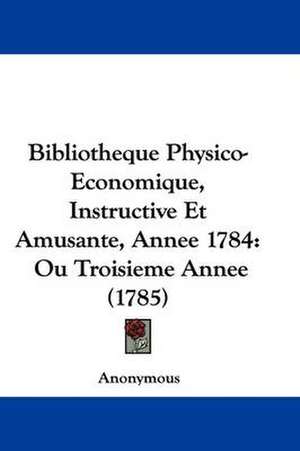Bibliotheque Physico-Economique, Instructive Et Amusante, Annee 1784
Autor Anonymousen Limba Engleză Paperback – 12 iun 2009
Preț: 239.14 lei
Nou
Puncte Express: 359
Preț estimativ în valută:
45.77€ • 49.22$ • 38.16£
45.77€ • 49.22$ • 38.16£
Carte tipărită la comandă
Livrare economică 16-21 decembrie
Preluare comenzi: 021 569.72.76
Specificații
ISBN-13: 9781104624873
ISBN-10: 1104624877
Pagini: 434
Dimensiuni: 152 x 229 x 23 mm
Greutate: 0.63 kg
Editura: Kessinger Publishing
ISBN-10: 1104624877
Pagini: 434
Dimensiuni: 152 x 229 x 23 mm
Greutate: 0.63 kg
Editura: Kessinger Publishing
Notă biografică
Vyasa (c. 200 BC) is the legendary author of the Mahabharata, Vedas and Puranas, some of the most important works in the Hindu tradition. Vyasa appears for the first time as the compiler of, and an important character in, the Mahabharata. It is said that he was the expansion of the God Vishnu, who came in Dwaparayuga to make all the Vedic knowledge from oral tradition available in written form. He was the son of Satyavati, adopted daughter of the fisherman Dusharaj and the wandering sage Parashara, who is credited with being the author of the first Purana, Vishnu Purana. He was born on an island in the river Yamuna. Due to his dark complexion, Vyasa was also given the name Krishna, in addition to the name Dwaipayana, meaning "island-born." According to the Mahabharata, the sage Vyasa was the son of Satyavati and Parashara. During her youth, Satyavati was a fisherwoman who used to drive a boat. One day, sage Parashara was in a hurry to attend a Yajna. Satyavati helped him cross the river borders. On this account, the sage offered her a mantra which would result in begetting a son who would be a sage with wisdom and all good qualities. Satyavati immediately recited the mantra and thus Vyasa was born. She kept this incident a secret, not telling even King Shantanu. The festival of Guru Purnima is dedicated to Vyasa. It is also known as Vyasa Purnima, for it is the day believed to be both his birthday and the day he divided the Vedas. Vyasa is also considered to be one of the seven Chiranjivins (long-lived, or immortals), who are still in existence according to Hindu tradition.
